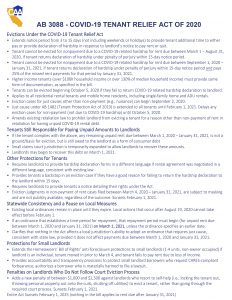LATEST IN THE LAW


Assembly Bill 3088 – COVID-19 Tenant Relief Act of 2020
September 2, 2020 0 Comment Category: Real EstateThe California State Legislature recently passed AB-3088, the COVID-19 Tenant Relief Act of 2020.
The prior versions of this legislation would have had devastating effects on Landlords, both large and small, and while this legislation is not perfect, it does supply some ability to move forward despite some limitations. We wanted to summarize some of the main points.
Nuisance Tenants
You can immediately proceed with providing 3 day notices to evict tenants who are nuisances or otherwise breaching their lease for any reason that is not related to the failure to pay money (rent or other charges)
Unpaid Rent from March to August 2020
Any unpaid rent from March 1, 2020 to August 31, 2020 due to a COVID-19 related hardship can not lead to an eviction. This rent shall be treated as consumer debt and can be recoverable by a small claims action. The limitations on the number of small claims actions (two per 12 month period) and the maximum amount have been removed so if necessary, you will be allowed to sue for all unpaid amounts regardless of amount. No lawsuit to collect, however, can be filed until at least March 1, 2021.
Rent Due from September 1, 2020 to January 31, 2021
If a tenant fails to pay rent over the next five months, you will have to give a 15-day notice rather than a 3-day notice (this is business days, not calendar days). The notice must include a declaration of hardship, which you shall have to provide to the tenants. If the tenant is unable to pay the rent owed, they must sign the declaration of hardship under penalty of perjury and pay 25% of the rent owed. If they fail to pay the 25% or fail to sign the declaration, Landlords are allowed to evict them. Those evictions may begin on October 5, 2020. Any unpaid amounts above 25% shall also be converted into debt just like the March to August 2020 rent. For all unpaid COVID-19 related rents, as stated above, you may not demand repayment of the unpaid COVID-19 related rent until March 1, 2021. That is also when you may start filing lawsuits for the money. No city can require repayment plans to start after this date.
No Fault Evictions
No fault evictions, such as those resulting from 60 day notices to terminate, may not be filed until February 1, 2021. This is essentially an extension of AB1482 and shall apply to all properties, both rent control and non-rent control. No fault evictions include, but are not limited to, Ellis Act, Landlord or relatives of the landlord occupancy, resident manager,
Proof of Inability to Pay
High-income individuals (those making over $100,000 annually) who have previously provided income verification so that you know their high income must provide proof beyond the declaration.
Other Evictions
Evictions of licensee (non-paying parties like certain managers), forcible detainers (squatters), or breaches of the lease not related to money can immediately move forward.
Pre-COVID-19 Non-Payment or Previously Pending Cases
Any tenant who failed to pay rent prior to March 1, 2020 can be evicted beginning on October 5, 2020. Additionally, any action that was pending prior to March 1, 2020 may proceed forward, however, no default may be taken until at least October 5, 2020. Moreover, if a judgment, either by trial or default, was previously obtained, we can proceed immediately with obtaining writs and scheduling Sheriff lockouts.
Small Landlord Protections
If Landlord is an individual and the property is 1 to 4 units and is not owner-occupied, Landlord is entitled to anti-foreclosure protections.
The California Apartment Association also released an explainer in greater detail, which you can view below.

Download the CAA Explainer, full version here.
The attorneys at Davidovich Stein Law Group have helped countless clients with resolving these types of issues. If you’re facing a similar dispute, call the office today on (818) 661-2420 to speak with a real estate attorney about your options.


leave A comment